

CHRISTIAN LEADER


How Christian is your business?
Introducing Muslims to Christ
Menno’s modern family
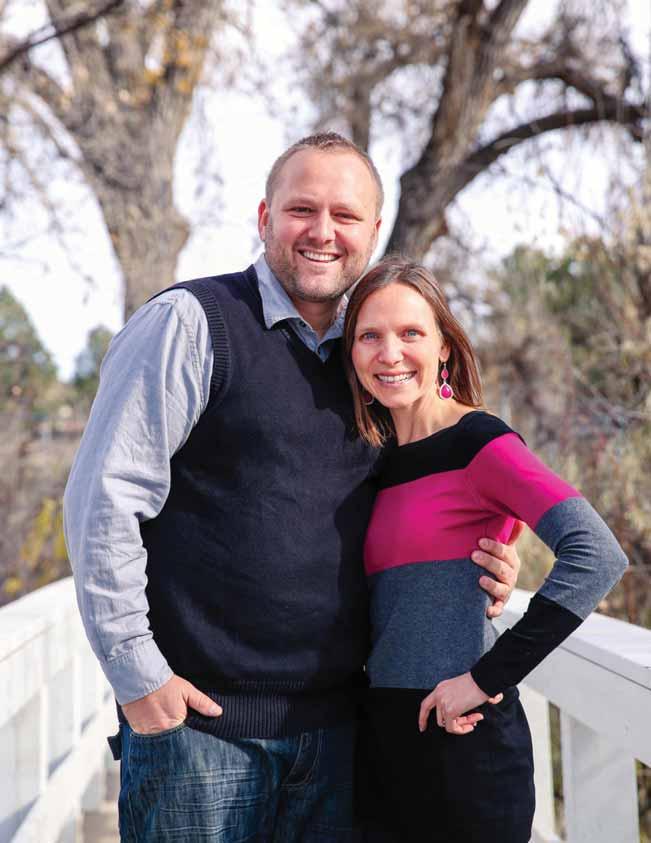








Discipleship is more than gaining knowledge. Discipleship is God at work in our lives, renovating our hearts and changing our behavior.

Connie Faber Editor
Anew national ministry plan will be unveiled this July when U.S. Mennonite Brethren gather for the National Convention. Several articles in this issue (pp. 5, 8 and 24) highlight the Future Story, the name of the document outlining this new vision and strategy.
Although the USMB Leadership Board’s current plan is to limit the information shared about the Future Story prior to the National Convention, we do know that it concentrates on three activities that will be carried out using a networking approach. The overall strategic focus is on:
• local, national and global church multiplication, church planting and evangelism,
• intentional disciple-making and
• leadership development. While all three initiatives provide exciting challenges for our churches, I am most excited about deliberate disciple-making.
Discipleship is more than gaining knowledge. Discipleship is God at work in our lives, renovating our hearts and changing our behavior. Discipleship is following Jesus. It is providing shelter for the homeless, liberating victims of human trafficking, healing the sick and doing what we can to eliminate the conditions and structures that bring about poverty, slavery and disease. Discipleship takes place in community, and that community extends beyond our local churches and neighborhoods to include our nation and the world. So the emphasis on networking—following Jesus in community—is spot on for us as Mennonite Brethren.
If we are successful in stirring a fresh commitment to discipleship among U.S. Mennonite Brethren, we will see leaders emerge and congregations grow. A renewed emphasis on discipleship is the foundation for the other two initiatives. Courageous discipleship in our world will both require and generate servant-leaders, and it will be the sweet-smelling aroma that will attract new followers of Jesus. May we boldly embrace this new commitment to become devoted followers of Jesus, disciples who are part of thriving communities of faith that strive to show our world how to live as God intended.
















Jared Pulliam

We all experience how helpful pictures can be. Whether we are working through some graphs before a business meeting or hoping the person who drew our IKEA directions really knew what they were doing, we recognize the important role pictures play in helping us understand. Jesus is the master teacher, and so it is no surprise that we read in the Gospels of how he used word pictures. Our Lord’s earthly ministry was conducted in an agrarian society, and he speaks in terms that were accessible to those around him. While Jesus uses vine imagery because of the contemporary relevance of the metaphor, this is not the only reason he speaks the way he does in John 15. Vines and vineyards were not only something commonplace in the lives of Jesus’s disciples; this vine imagery carried with it deep, spiritual significance for the Hebrew people.
Reading through the Old Testament, we come to passages where God describes the people of Israel as a vine that he had brought out of Egypt and magnificently planted (Ps. 80:8-11). But we also see that, rather than Israel growing as a fruitful vine and producing a healthy crop, the people of God grow to be a wild vine (Jer. 2:21) that yields bad grapes (Isa. 5:1-7). In other words, while enjoying all the benefits of being cultivated by God’s own divine hand, Israel proved to be unfruitful—they did not produce the works of righteousness that must mark God’s holy people.
Of course, this does not mean that God’s purposes are thwarted. By observing Israel, the unfaithful vine, we are compelled to hope for the coming of the one who would be faithful.
Here in John 15:1, Jesus tells us that he is the true vine. Jesus is the one who lived a perfectly righteous life before the Father, bearing good fruit. In so doing, Jesus not only fulfilled the holy calling of God’s people, but in his obedient death and vindicating resurrection, he proves to be the vine that nourishes God’s people with redeeming life. It is only in connection to Jesus, the true life-giving vine that we can be incorporated into the people of God, and it is only in connection to Jesus that we can bear good fruit for God. Jesus is the source.
The question for us becomes one of connectedness. Are we people who, by faith in Christ and obedience to the Word of God, remain attached to the true vine? Or are we tempted to think that it is possible to be God’s productive people without a conscious, active, humble, reliance upon life-giving Jesus and his Word? This picture compels us to turn our attention to Christ afresh, abiding in him, and in so doing we will bear much fruit.
Jared Pulliam is the pastor of Christ Church Sellwood, a USMB church plant in the greater Portland, Ore., area.

“I am the true vine and my Father is the gardener.” John 15:1
CHRISTIAN LEADER
May / June 2016
Volume 79 • Number 3
Connie Faber EDITOR
Myra Holmes ASSISTANT EDITOR
Shelley Plett GRAPHIC DESIGNER
Angela Kleinsasser
COVER PHOTO (See story page 10)
The Christian Leader (ISSN 0009-5149) is a gathering place for the people, passions and mission of U.S Mennonite Brethren. The Christian Leader is published bimonthly by the U.S. Conference of Mennonite Brethren Churches. However, the opinions expressed here are not necessarily those of the church as a whole.
COPYRIGHT The articles printed in the Christian Leader are owned by the CL or by the author and may not be reprinted without permission. Unless noted, Scripture quotations are from the New International Version.
READER PARTICIPATION Letters to the editor should be 300 words or less and on one subject. Letters must be signed and include the writer’s city and state. Letters will be edited for clarity, appropriateness and length. Letters will be published, as space allows, unless marked, “Not for publication.” Readers interested in contributing essays for In My Humble Opinion and First Person should contact the editor. Freelance article submissions are welcome; a SASE must accompany articles.
SUBSCRIPTIONS $10 for six issues and $20 for 12 issues ($15, $30 in Canada; all other countries $25 for six issues); $1.50 per copy
CORRESPONDENCE: All correspondence, including subscription questions and address updates, should be addressed to Christian Leader Box 155, 107 N. Main, Hillsboro, KS 67063-0155 Phone: 620.947.5543
E-mail: christianleader@usmb.org
MEMBERSHIP The Christian Leader is a member of the Evangelical Press Association and Meetinghouse, an association of Mennonite and Brethren in Christ editors.
POSTMASTER Send address changes to Christian Leader, Box 155, Hillsboro, KS 67063. Periodicals postage paid at Hillsboro, Kansas.
The Christian Leader is published by

U.S. Conference of MB Churches

Don Morris Interim executive director
Living abundantly as we press on
Matt Heard to speak at USMB National Convention
This Conference Call is just that, a call to a conference! The USMB National Pastors’ Conference and National Convention will take place July 27-30 in Denver, Colo. With the theme “Press On,” this gathering of Mennonite Brethren from all over America will focus on what it means to live life abundantly as we press on toward our ultimate goal of heaven.
Matt Heard will be the guest speaker for the Pastors’ Conference and the National Convention. Heard and his wife, Arlene, live in Colorado Springs, Colo., and are the parents of three adult sons. A speaker and writer, he was the senior pastor at Woodmen Valley Chapel, Colorado Springs, for 12 years. Whether standing in front of people with a microphone or in a trout stream with a fly rod, whether sitting around a dinner table with friends or serving a need in his city, Heard loves exploring and experiencing “Life with a Capital L,” the title of his recent book.
Jim Daly, president of Focus on the Family, writes of Heard’s book: “I know Matt Heard to be a thoughtful, humble follower of Christ. Those qualities are evident in Life with a Capital L. This book is a clear and powerful call to rediscover the depth and breadth of life as God intended—to embrace the longing we all have to really live as humans made in God’s image.”
During the Pastors’ Conference, Heard will help our pastors and spouses gain more understanding about how pastors can enjoy lives that are alive, exciting and fulfilling. Many pastors’ lives are filled with stress and busyness. Heard wants to help them see that “the pastoral life can be one that is empow-
ered, equipped and inspired by the One who created us to live abundantly.”
Along with input from Heard, National Convention goers will learn from multiple workshops, be inspired by lively worship led by The Rock of Southwest, a USMB church in Denver, and cheer over stories from existing churches and church plants. Plus, we’ll reveal a brand new USMB vision and Future Story for all of us to rejoice about. Over the past two years, leaders and church representatives have been working hard at discovering this new godly vision and putting flesh on the new bones. We’ll celebrate together as we envision the future God is calling us to. I personally think this will be one of the most remembered conventions in our history as we discover more about this new path forward.
At conventions, I also enjoy being around people that I don’t regularly see and visit with. We’re part of a great collection of churches, and there has consistently been a “family atmosphere” at our gatherings.
All of this takes place at The Westin Westminster hotel in Westminster, Colo., a suburb of Denver. You’ll want to register now and also reserve your hotel room. Pastors: Come to the Pastors’ Conference that begins Wednesday, July 27, with dinner and concludes Friday with lunch. For everyone: The National Convention begins July 29 with a reception at 4:30 p.m. Of course, there are all kinds of things for kids to do, and families can extend their vacation in this beautiful part of God’s creation. Please join us, and we’ll press on together! You can find all the information you need on the USMB website at www.usmb.org.
We’ll celebrate together as we envision the future God is calling us to. I personally think this will be one of the most remembered conventions in our history as we discover more about this new path forward.
FirstPerson
Brad Burkholder
#HesstonStrong?
When I am weak and Christ is strong
Thursday afternoon, Feb. 25, an employee of Excel Industries, Hesston, Kan., returned to work. Armed with an AK-47, he killed three coworkers and injured another 14. Many others in the plant and community were wounded mentally and emotionally on that day.
Social media quickly reflected the thoughts of our community:
• “How could this happen in our safe, little town?”
• “If this can happen in Hesston, it can happen anywhere.”
• “Why did this happen?”
Hesston responded as I imagine any closeknit, rural community would. They baked food. They donated money. They mourned together. They prayed together. They supported the victims, first responders and the company. They acknowledged the heroes. They took on a slogan.
Our rallying cry is #HesstonStrong. Lance Armstrong coined the phrase LiveStrong as a response to dealing with cancer in his own life and to improve the lives of those affected by cancer. Boston altered this slogan after the terrorist attack at their marathon in 2013. Since then, it seems to crop up wherever tragedy strikes. I think I know what it means: We will work together. We will not give up. We will not be afraid.
But let’s be honest, we are not really that strong. We have just as much fear (or more) as before. We have just as much pride (or more) as before. We are just as offended (or more) as before. We are just as human as before.
We are weak. We are very weak. Every day we face temptation ... and lose. Every day we vow to try a little harder, get a little better ... and still fail. True, most of the time it does not end in the loss of human life. But when it comes to being strong, being good, I am weak.
Paul tells us in 2 Corinthians 12:9 that we are strong when we acknowledge weakness. “But he (Jesus) said to me, ‘My grace is sufficient for you,
for my power is made perfect in weakness.’ Therefore, I (Paul) will boast all the more gladly about my weaknesses, so that Christ’s power may rest on me. That is why, for Christ’s sake, I delight in weaknesses, in insults, in hardships, in persecutions, in difficulties. For when I am weak, then I am strong.”
What! Admit weakness? Admit I have a need, that I don’t have it all together, that I need help? Admit that I’m “bad”? If I do that, then I’m no better than the shooter. And I can’t have people thinking that.
Just a couple of chapters earlier, Paul reminds us that God “made his light shine in our hearts ... and we have this treasure in jars of clay to show that this all-surpassing power is from God and not from us. We are hard pressed on every side, but not crushed; perplexed, but not in despair; persecuted, but not abandoned; struck down, but not destroyed. We always carry around in our body the death of Jesus, so that the life of Jesus may also be revealed in our body” (2 Cor. 4:6-10). Through our lives as disciples and through the joys and sorrows that life brings, God is glorified.
In the last few days I have connected with one of the shooting victims. He showed me his injuries. He talked about how his life changed forever in those few seconds of interaction with the shooter. But he said, “I love my job. There’s something different about working at Excel and working in Hesston.” I told him I believe it is not because of who we are but because of what Jesus has done. Before I left, he let me pray for him and his family.
My community needs the hope and love of Jesus Christ. Not just for some day in eternity. They need it for today. A unique window of opportunity has opened. Christ is revealed when I admit that I am weak and he is strong. #JesusStrong.
Brad Burkholder is lead pastor of Hesston (Kan.) MB Church.

USMB Leadership Board approves “Future Story”
When the USMB Leadership Board met Feb. 24-25 in Phoenix, Ariz., members unanimously approved the latest draft of Future Story, a new national ministry plan that focuses on local, national and global church multiplication, intentional disciple-making and developing leaders. While the board continues to keep details of Future Story under wraps, specifics will be shared with delegates at the USMB National Convention in July, according to Marv Schellenberg, board vice-chair. Now that details of the Future Story have been fleshed out, the Leadership Board is resuming its search for a USMB lead staff member; at the February meeting, the board worked on the job description for the USMB national director.
The board also heard updates on discussions with MB Mission and the Canadian Conference of MB Churches, specifically C2C, regarding working together in U.S. church planting projects. MB Mission is the North American mission agency; C2C is the Canadian Conference’s church planting ministry.
David Hardt, Leadership Board treasurer, reported that USMB has “ended the 2015 year in the best position it has been in for years,” according to board minutes, while the 2016 budget is “strong to date.”
In other business, the Leadership Board considered a proposal from the 2015 National Youth Convention planning team to expand their work to also include equipping youth workers and encouraging service among youth groups; determined that beginning in 2017, USMB will no longer fund a U.S. office of Kindred Productions; and reviewed the list of nominations and vacancies for USMB boards that will be voted on by delegates to the National Convention in July.—CL
BFL discusses issues
The USMB Board of Faith and Life continued discussing follow-up initiatives to the revised Article 13 of the Confession of Faith when they met Feb. 2324 in Phoenix, Ariz. Details of these initiatives will be reported at the USMB National Convention in July. The board also had a vigorous and lengthy conversation about a resolution on women in ministry and discussed how best to assist pastors with issues they are facing as they provide counsel related to lesbian, gay, bisexual and transgender (LGBT) individuals and how best to engage young people in helping them differentiate between biblical and cultural views.—CL
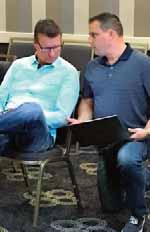

Searchable CL drives available
A searchable, digital collection of 79 years of the Christian Leader will soon be available on a USB drive thanks to a cooperative project initiated by the Center for Mennonite Brethren Studies (CMBS) in Hillsboro, Kan., and CMBS in Winnipeg, Man., and with the assistance of Christian Leader. The drives will be available for a discounted price of $20 at the USMB National Convention, to be held July 29-30 in Denver, Colo. The price will increase to $25 after the convention. Annual updates will be made available at no extra charge. –CL
Treasurer David Hardt, pictured right with Marv Schellenberg, reported USMB finished 2015 in strong financial position.
Workshops designed to equip
Workshops at both the USMB National Convention and National Pastors’ Conference, to be held July 27-30 in Denver, Colo., will equip attendees to “press on” to deeper life with Christ. “Our overall goal for the workshops is that they will be truly helpful and informative, providing significant ‘take-aways’ for attendees,” says Don Morris, USMB interim executive director. Workshops will provide resources for building the church, address current issues and encourage pastors and ministry leaders. USMB leaders will unveil the denomination’s Future Story at the convention, and attendees will have opportunity to discuss this new national ministry plan during two convention workshops. Developing the Future Story has involved prayer, evaluation and processing. Morris says, “The Future Story workshops will allow attendees to ask specific questions and gain clarity pertaining to the exciting new vision being laid out for us as a conference of churches.” A full listing of workshops is available at www.usmb.org/PressOn2016. —USMB



byTheNumbers
Since the Syrian war began 5 years ago, Mennonite Central Committee has sent the following kits to the region:
218,786 SCHOOL KITS
140,014 HYGIENE KITS
30,345 RELIEF KITS
5 minutes with...

Jeff Neher
“Kids, kids and more kids” sums up the life of Jeff Neher of North Oak Community Church, Hays, Kan. Neher’s first set of kids were the congregation’syouthwhohehaspastoredfor16-plusyears.Then camesixkids,currentlyages11/2 to 13, born to Neher and his wife,Jesica.TheNehers’thirdcropofkidsstartedwithtwo milking goats in 2013 and grew to 30 boer meat goat does and the45kids(i.e.babygoats)theyproducedthisyear.


How did you get started with goats?
We were spending about $35 a week on milk. We looked into ge ng a cow, but goats fit our barn be er and they’re more our kids’ size.
Why did you expand it beyond the two milkers?
I wanted our kids to learn how to work and what it takes to run a business. When they win prize money showing their goats at the fair, they reinvest it in more goats. Kaleb (13) and Karli (11) got their first goats from my dad. As their younger siblings come in to show, they have to give them a goat to get started.
How successful has the business been?
Of course there are disappointments. For instance, the first doe Kaleb bought for $700 didn’t produce any offspring. But both Kaleb and Karli have won top awards at the Kansas State Fair. We sell to local 4H members who show in our county fair. Last year the top 12 goats in the show came from our farm.
How do you divide the chores?

Karli feeds and milks the two milkers. Kaleb takes care of the hay for the bucks and fills every water bucket on the farm—a goat without water is a dead goat. I feed all the grain. That way I can look them over every day.
What similarities do you see between your various “kids?”
Goats seem to find amazing ways to get themselves in trouble. With people and with goats you always have to watch for signs they’re headed down the wrong path.
Interview by Kathy Heinrichs Wiest
Foundation hires Fast

MB Foundation (MBF) has hired Dennis Fast to serve as church relations director, a new position. Fast served for more than 16 years as senior pastor at Hillsboro (Kan.) MB Church, then more than 17 years at Reedley (Calif.) MB Church. He has also held a variety of conference and district leadership roles. He will join the Fresno, Calif., MBF team June 1. MBF is the stewardship ministry of U.S. Mennonite Brethren.—MBF

2016 archival intern announced
Andrew Brown is the recipient of the MB Historical Commission’s summer archival internship for 2016. Brown, who graduated from Canadian Mennonite University, Winnipeg, Man., in April, will spend five weeks visiting each of the Mennonite Brethren archival centers in North America. The summer internship is made possible with support from U.S. and Canadian Mennonite Brethren Churches.—MBHC

FPBS offers chaplaincy training
A new partnership between Fresno Pacific Biblical Seminary (FPBS) and Clinical Pastoral Education that began in early 2016 gives seminary students a chance to expand their skills and employment possibilities as much-needed chaplains in hospitals, hospice agencies, jails and prisons. Among the major themes of the training are providing ministry of presence, developing active listening skills, spiritual assessments, avoiding compassion fatigue and ways chaplains can understand and work within the medical system. FPBS is the Mennonite Brethren denominational seminary and part of Fresno Pacific University, Fresno, Calif. —FPU
MCC response breaks record
Since the Syrian war began five years ago in March, Mennonite Central Committee (MCC) has spent about $34.6 million to relieve the suffering of Syrians, Iraqis and people in neighboring countries who have been impacted by violence. It is the organization’s largest financial response in its 96 years of existence—larger than the response to the 2010 Haiti earthquake or the 2004 Indian Ocean tsunami. MCC provides peace, relief and development in the name of Christ. For more information or to donate to the ongoing response, visit www.mcc.org. —MCC
MBF announces date for Celebrate 2017
A second national gathering for senior adults, hosted by MB Foundation (MBF), is planned for Sept. 29-Oct. 1, 2017, in Denver, Colo. MBF, the U.S. Mennonite Brethren stewardship ministry, hosted the first such event, Celebrate 2015, in October 2015 in the Kansas City, Mo., area. Registration information and other details for the 2017 event will be made available through MBF as they are developed. For more information, contact MBF at 800-551-1547—MBF
Chronicles commentary released

Herald Press has released the 30th volume of the Believers Church Bible Commentary, 1 and 2 Chronicles, written by August H. Konkel, professor of Old Testament at McMaster Divinity School. Konkel incorporates the story of his Mennonite Brethren grandparents as well as key Anabaptist figures in the Reformation as examples of the value of a strong faith. The commentary is available from Herald Press at 800-245-7894 or www.HeraldPress.org.—Herald Press





















OMarriage is worth fighting for.







Four things I have learned about marriage from my wife
By Trevor Lee
ver the years I have learned many things about marriage from many people. My parents taught me that commitment is an essential component of love. My wife’s stepfather has taught me what it looks like to be selflessly generous as a husband. Some dear friends at church have helped me grow in my understanding of how to press into the uncomfortable places of marriage to find growth and healing.
But there is one person who, more than any other, has taught me about marriage—my wife. Here are four things I’ve learned about marriage from Michelle.
The first few years of our marriage I thought our marriage was a unicorn. Everyone told us that the first year, it would be all we could manage to grit our teeth and survive. But the first year passed without any significant difficulty. In fact, it was really fun. This smooth ride continued in the following years, and I started to think all the accounts of marital struggle didn’t apply to us. You know how that turned out.
Michelle and I have now been married 15 years, and it hasn’t always been smooth. One of the things I love most about her is how disturbed she is when we’re not doing well. I don’t just mean when things are really rough and we are both acutely aware that we need to work through some things. I’m talking about the times when the kids keep us running around, and almost without notice we end up disconnected. I’m talking about the times when an exchange has an unnecessary edge. The times we skip a kiss goodnight. Those times disturb Michelle, and she doesn’t let them pass.
Michelle consistently models the truth that marriage is worth fighting for. And it’s not just worth the fight when
things are going horribly wrong. It’s worth fighting for every day when you come home from work, when you wake up and when you see each other in passing. Each moment is an opportunity to take a small step toward wholeness and beauty or toward brokenness and pain.
I have choices even when my marriage feels out of control.
There are times in a marriage when for a variety of reasons we find ourselves in a place we wouldn’t choose. We aren’t as connected as we’d like to be. We’re butting heads out of the blue. We may even feel emotionally or physically pulled toward someone else. There are things that contribute to this, but they go undetected and all of a sudden our marriage feels out of control.
When that is the case, it is so important to understand that we have choices about what we do in the midst of it. Michelle and I have gone through times where our marriage felt out of control. Neither of us knew how to “fix” things. But this didn’t stop Michelle from stepping up her practice of the things that build our marriage. She encouraged me more than normal. She reminded me that she loves me with a love that goes beyond how she feels at a given moment. She bought my favorite iced coffee even though the price tag usually keeps me from buying it.
I can guarantee she didn’t feel like doing all those things. She just made up her mind to do them. And I think Michelle knew that none of them would be a magic Band-Aid that made everything better. But in the midst of marital turbulence she made choices to move toward me rather than away from me. That is not the natural direction in those times—it is a direction that takes courage, intention and practical action.

I know the love of God more because of what I have experienced with Michelle.

Working on myself is an act of love.
Lately God has been working with Michelle in some really deep and painful ways. She has entered into these tender and difficult places with grace and courage. She has responded to the presence of God in painful places—not shutting him out but choosing to let him work. She is not doing this for the sake of our marriage. She is doing it out of love for Jesus and hope in his intentions for her. But when the “two become one” it is inevitable that the development and transformation of one, or regression and destruction, will significantly impact the other.
As I watch Michelle learn to trust God in the unsafe places, to give things over to him that she has held tightly and to find a depth of connection with him that can only come from difficulty, I see it affecting our marriage. Don’t get me wrong; I’m not saying this is the primary point. But we also shouldn’t pretend that our own formation is divorced from our marriage. As we work on ourselves, we are becoming the kind of person who can be a better spouse. Refusing to work on ourselves is not an act of sacrifice; it is an act of selfishness. To be honest, I’d rather buy Michelle flowers or rub her shoulders than enter into the painful places where transformation is needed. But the latter is a greater gift. She’s inspiring me to see that working on myself is an act of love I can offer to God and to her.


working is through my wife’s actions. I need

Our spouses help us see what is and what can be.
Michelle’s vision of who I am and can be is significantly different than the vision I have of myself. She knows my faults. She knows them well. And somehow, with that knowledge, she is still able to look at me and see the person who is “fearfully and wonderfully made.” She sees what I can become, not just what I am. She calls it out of me, entreating me to believe it.
That is the vision we should pursue of our spouses. Not a vision that denies flaws but



She sees my deep flaws and loves me anyway. That’s what God does too.


By R. Paul Stevens


The presence of a Christian in a business does not necessarily mean the business is Christian, as some Christians keep their faith and daily work in separate compartments. Here are 10 things that can mark a Christian business.
1. The presence of Christians with a sphere of influence. Owners, managers and employees can “incarnate” their values into every aspect of a business. Clerks, for instance, can draw an imaginary 30-foot radius around their workstation and regard it as their “parish” where all people, structures, equipment and interactions are within their circle of prayer and influence.
2. A product or service in harmony with God’s creational purpose. Adam and Eve were called to be priests of creation, to “work it and take care of it” as trustees and stewards (Gen. 2:15). They—and all of us who are restored to our human vocation
through new life in Christ—had three full-time jobs: communion with God, community building and co-creativity with God, the latter including productive jobs and trade. Almost no place in the work world is so demonized that a Christian might not be called to serve there, exceptions being businesses that thrive on prostitution, drug traffic, weapons and the exploitation of the poor.
3. A mission or purpose beyond mere profit. Of course, a business must make money or it will not last. Customers need a value for which they are willing to pay, so profit is a legitimate measure of the value the firm is producing for its customers. But those that exist only to make money are not very satisfying and will eventually fail. A Christian business needs a well-defined mission that is held before all employees—why does the business exist; what does the business want to be; what are its val-



ues; what is its vision for its other stakeholders, such as the larger community, the environment and future generations?
4. Product and service excellence suggests the presence of the kingdom. A Christian in business strives to provide excellent services or products that surprise customers rather than leaving them yearning for more or resigned to the minimum. Jesus invited his disciples to “do more” (like loving enemies) than the tax collectors and pagans (Matt. 5:43-48). Extraordinary service and quality invites the question “Why?” On the other hand, unpaid bills, slow delivery, poor quality, dishonest advertising and sloppy workmanship all speak louder than verbal declarations.
5. Customers are treated with dignity and respect. “The customer is always right” is the secular version of this. But there’s more. Christians in business treat every customer as a person to be loved and appreciated whether or not business is transacted. Difficult customers also need love, even when they are wrong.
expressed anywhere. What makes work Christian is not its religious character or even that it may be visibly “peoplehelping” but because it is an opportunity to express faith, hope and love and to work wholeheartedly (Eph. 6:7). A Christian employer can see every interaction with an employee as an equipping opportunity to train, encourage and release potential.
7. All aspects of business are potentially ministry. Christian businesspeople do not create a secular-sacred division in business; witnessing is sacred but doing the accounts is secular. All is part of our creation mandate (Gen. 1: 26-28) and is done for Jesus (Col. 3:23) and to God’s glory. English reformer William Tyndale said, “There is no work better than another to please God; to pour water, to wash dishes, to be a cobbler or an apostle, all is one, to wash dishes and to preach is all one, as touching the deed, to please God.”



8. The culture of the business lines up with God’s purposes. The environment or culture of a business “speaks” more loudly than any stated policy. People “get the message” as soon as they walk into a store or a factory. Managers can convey a culture through the values they promote (honesty, dignity, equality and respect) and how failure and mistakes are handled. A Christian manager can be a community-builder in business, a “pastor” in a secular context.
Unpaid bills, slow delivery, poor quality, dishonest advertising and sloppy workmanship all speak louder than verbal declarations.
Loving customers as oneself is neighbor love (Matt. 22:39). A salesperson will sell only on three conditions: the customer wants it, needs it and can afford it. Love for competitors is even harder. The Old Testament offers a powerful model of harvesting with the poor in view (Deut. 24:1922), which means leaving something on the table.
6. Workers are equipped to achieve their potential. It is tragic when Christians are poor workers because their real interest is in evangelism and church activities. Work is part of our calling to live for God’s glory and to share in Christ’s purposeful rule in all creation, a calling that can be
9. The leaders are servants. “Servant leadership” is so commonly used it is easy to forget how these two words cannot normally be brought together. Being a servant leader (Matt. 20:25-28) does not mean being passive—there is room for godly ambition, dreams and visions. Servant managers/ leaders want to equip and bring the best out of employees and can be measured by their advancement.
10. The business runs on grace. Business takes Christians into the economic, social and political structures of society that have become broken and polluted by human sin. Christian businesspersons find themselves frequently in situations where there is no easy answer, no “black and white” choices. While they may seek to make difficult decisions prayerfully on the basis of Scripture and in fellowship with other believers in business, inevitable mistakes and compromises will be made and sins committed. These must not be excused but neither must they destroy. There is forgiveness and hope.
R. Paul Stevens taught marketplace theology at Regent College, Vancouver, BC, for many years. This article first appeared in The Marketplace, the magazine of Mennonite Economic Development Associates.

ByAaronMyers

God’s view of the “Muslim problem”
God is bringing Muslims to North America. Are we ready to help them find Christ?
Amidst the smells of East African spices, Mohammed smiles at me across the counter of his busy grocery store as he begins his story. His, like so many Muslim immigrants in Sioux Falls, SD, begins in war and famine and fear. For Mohammed it began in Somalia.
It was the late 90s when the chaos of war caught up with him and his family. I’m not sure if time has brought healing or if his story is just so common that he is immune to the pain, but he launches into a matter-of-fact retelling of the murder of his neighbors right before his eyes. The same gun that had killed them was turned on him, and he suffered gunshot wounds to his leg and his stomach.
“It was God’s mercy,” he says as he hitches up a pant leg to show the scars. He continues, telling of his attacker stepping up to his bleeding body and preparing for one final shot, only to be called away with the jest, “Don’t waste the bullet. He’s dead.”
His attackers left. Mohammed was found, treated and evacuated to Kenya where his healing commenced. He lived for a time in one of the region’s many sprawling refugee camps. A few years later, however, he won the lottery—refugee status, a plane ticket and a new home in South Dakota. That was 19 years ago.
It is winter and it is cold outside, but when I ask how he likes Sioux Falls, Mohammed beams, “I love Sioux Falls!” He has worked hard, starting three different businesses that he runs with the help of his father and his wife. His children are healthy and will have every opportunity to grow up with a sense of security he could never have dreamed of in his own childhood.
Muslims: A diverse group
Mohammed is one of the 5 million Muslims of the 1.6 billion worldwide that call North America their home. They have settled in large metropolitan cities as well as rural towns. They come for a variety of reasons: some immigrate as professionals, others arrive as international students and some are resettled as refugees escaping horrendous situations in their home countries.
While many of us think of the Middle East when we think of Islam, just 20 percent of the world’s Muslim population is from there. The vast majority are living in Asia and Southeast Asia and are culturally quite different from their Middle Eastern counterparts. Much like the world of Christianity, Muslims are a diverse and varied group.
For many of us American Christians, our only interaction with Muslims is through the nightly news and a daily dose of talk radio. The narrative is frightening. Regular stories of violence, terrorism and brutality have slowly shaped our thoughts about Islam and our attitudes toward Muslim people.
Muslims among the least reached
Amidst this cacophony of conversation surrounding Muslim immigration and the threat of terrorism, we risk misplacing the call to go and make disciples among Muslims under a mountain of fear. Muslim people groups are among the least reached peoples of all time.
They live in places where conversion is illegal, where the Bible is nearly impossible to find and where followers of Christ are few and far between. It is from these dark places that God is bringing Muslims to North America.
In Acts 17:26-27, Paul says, “From one man he made all the nations, that they should inhabit the whole earth; and he marked out their appointed times in history and the boundaries of their lands. God did this so that they would seek him and perhaps reach out for him and find him, though he is not far from any one of us.”
We may be tempted to think that God is fretting over what to do about Muslims moving into our neighborhood, but we need not worry. He has a plan and his plan includes his church. He has always used his church to reach the lost. The so-called “Muslim problem” is no problem for God. They are his children, created in his image, and he is passionate about reconciling them to himself. And he is doing just that across the Muslim world. In fact, more Muslims have come to faith in Christ in the last 15 years than in the previous 1,500 years combined.
How should we as Christ’s followers respond to the growing Muslim populations around us? How can we position ourselves so that when Muslims begin to seek Christ and perhaps reach out for him, we can be ready to help them find him?
The place to begin is almost always with ourselves. We must examine our hearts to see if there are attitudes or fears that are keeping us from obeying Christ’s commands. We must pray that Jesus would work to bring us into alignment with his will—that Muslims would know and worship him.
Next we should take some time to learn about Islam and about Muslims. Begin with a book or a study. Crescent Project’s Bridges DVD study is a great place to begin and will allow you to move into greater awareness and knowledge about Islam and Muslims with a small group or Sunday school class.
Ask God for a Muslim friend
Finally, I would encourage you to ask God for a Muslim friend. The single greatest factor in Muslims coming to faith in Christ around the world is friendship with an authentic follower of Jesus. It is a theme repeated over and over again, and it could include you.
It is the story of my friend, Ali.
Ali was working for the U.S. military as an interpreter in Iraq when life became too dangerous for him to remain in his native country. He was graciously offered asylum by the U.S. government and found himself living in a large West Coast city.
As an Iraqi Muslim he was lonely but busied himself with translation work and frequent trips to the local gym to work out. On one occasion, as he was finishing up with one of the weight machines, a burly guy in a tank

top approached and asked if he was done with his machine?
Ali’s English is good but he was unsure if the man was joking or serious and so stepped timidly away from the weights. The man, sensing Ali’s fear, broke into a smile and assured him he was joking. “My name is Jake,” he said.
Jake was the first American outside of work who had talked to Ali. He asked questions and when he heard Ali’s story, invited him over for pizza. Ali liked Jake and so when he was asked if he’d like to
come back the next day for a Bible study which Jake hosted with a group of friends, Ali readily agreed to come.
Ali had no idea what a Bible study was and Jake had little to no idea about Islam. What they did know is that they had a friendship. It was that friendship and that Bible study group that led to Ali giving his life to Christ six months later. It seems like a simple thing—crossing the room to say hello.
But for Ali, it was the beginning of a journey toward new life in Christ.
Aaron Myers serves as a mission mobilizer with MB Mission in the Midwest and as the South Dakota area coordinator for Crescent Project. His heart for the Muslim world developed when he and his family served in Istanbul, Turkey from 2008 to 2012.
CRESCENT PROJECT’S BRIDGESis a six-session DVD small group study designed to help Christians connect with Muslims. It provides biblical teaching about Islam and what Muslims believe, opening the door for better understanding between the religions. Crescent Project’s mission is to inspire, equip and serve the church to reach Muslims with the gospel of Christ for the glory of God.
JOURNEY TO JESUS, published by Tyndale House, 2014, is a six-session resource that teaches Christians how to reach out to Muslims in friendship with the love of Christ. Through high-quality, live-action video dramatizations and engaging teaching materials, your small group, church or Bible study group will explore the culture and background of Muslims, as well as meet three types of Muslims: refugees or new arrivals, culturally liberal and conservative Muslims.
MUSLIMS, CHRISTIANS AND JESUS: GAINING UNDERSTANDING AND BUILDING RELATIONSHIPS, published by Zondervan in 2011, is designed to help build lifechanging bridges with your Muslim neighbors. In this four-session small group Bible study DVD, Carl Medearis, an international expert in the field of Arab-American and MuslimChristian relations, provides background information on Islam and tools for sharing Christ with Muslims. The study helps viewers understand the basics of Islam, the difference between “moderate” Muslims and radical terrorists, the Muslim view of Jesus and how we should interact with our Muslim neighbors, friends and coworkers.


—compiled by Aaron Myers
Menno’s modern family
ICOMB nurtures global family relationships, spreads gospel
to the world
When global Mennonite Brethren leaders meet next month for the annual summit of the International Community of Mennonite Brethren (ICOMB), it will be something like an extended family gathering. Leaders representing the 21 national Mennonite Brethren conferences will gather June 2-5 in Panama City, Panama.
David Wiebe, ICOMB executive secretary, says that, at its simplest, ICOMB is “the word we use to describe our global Mennonite Brethren family.” So when these leaders who share a spiritual heritage meet together, they do what families that share a biological ancestry do when they get together.
The ICOMB representatives will hear stories of ministry and challenge from each conference and take plenty of time to pray for each other. They’ll learn from each other in workshops about spiritual, theological and structural vitality. After they wrap up their formal meeting, they’ll take a road trip—make that a river trip— and travel June 6-8 to the indigenous village of Platanares to engage more fully with Iglesia Evangélica Unida-Hermanos Menonitas, the Panamanian conference hosting this year’s summit.
Interaction that “pushes us”
Interacting with brothers and sisters from other cultures
in this way “pushes us,” Wiebe says. ICOMB members around the world face “mitigating circumstances” that Wiebe summarizes with four “P” words—persecution, poverty, politics and plenty. He notes that each family member, even the more seasoned ones like U.S. Mennonite Brethren, can learn about faithfulness from those who face other realities: “How can we be faithful in the midst of mitigating circumstances?”
Ed Boschman, who represents U.S. Mennonite Brethren to ICOMB, says hearing those stories of difficult circumstances has been particularly powerful for him. When a leader from a country facing persecution or struggle shares, then talks about the privilege of suffering for the sake of Christ, “That grabs me by my spiritual throat,” he says. And when they turn to him and humbly wash his feet, he says, it’s almost more than he can bear.
He adds, “It’s a call to perspective and to recognize that my relatively easy Christian existence in this part of the world is not the whole story.”
Ready for chapter two
This global family grew out of a passion for mission. In fact, Boschman likens ICOMB to a “second chapter” of mission.
Wiebe explains that as various national churches— many the result of mission work—matured and grew
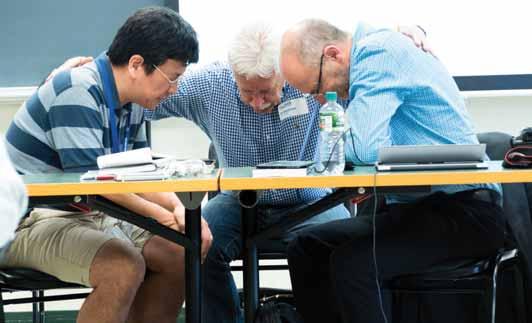
Ed Boschman, center, USMB representative to ICOMB, prays with Yoshifumi Tanaka of the Japan MB conference and Heinrich Klassen from Germany, who represents the Bund Taufgesinnter Gemeiden. Tanaka is the ICOMB vice-chair, Boschman is the treasurer and Klassen serves as secretary. They, together with Rudi Wiebe of Paraguay and David Wiebe, ICOMB executive secretary, form the ICOMB executive committee.
more independent, MB Mission leaders recognized that those conferences had different needs than the emerging churches in outreach areas.
In an effort to facilitate relationships and dialogue, ICOMB was founded as a committee of the North American global mission agency in 1990. It was originally called the International Committee of Mennonite Brethren. In 2005, the name was changed from “committee” to “community” to better reflect the familial nature of the group; the acronym remained unchanged. And in 2012, MB Mission ended funding for various ICOMB expenses, and ICOMB became its own entity.
Wiebe says the two bodies, while still closely connected, now serve different functions. MB Mission focuses on beginning new works among the least reached around the world, while ICOMB “gives place for the established conferences,” as Wiebe says.
Shared distinctives, goals
While biological families share certain DNA, ICOMB members resemble one another theologically. A Global MB Confession of Faith (COF), adopted in 2004, gives voice to shared theological distinctives. Boschman says that while this international COF is a different document than the USMB Confession of Faith, the two are compatible and U.S. Mennonite Brethren will recognize clear similarities.
“Our Confession of Faith does bind us together,” Boschman says. “We have a clear familial bond.”
Family likeness is also expressed in a common goal. Despite differences in language, culture and circumstance, ICOMB members share a similar mission to take the gospel to the world. Boschman says, “ICOMB is a people on a mission, collectively.”
Wiebe notes that across the globe, ICOMB churches are eagerly taking up the challenge of witnessing and church planting—“grabbing the bull by the horns and going for it.” He points to rapid growth in India, Laos, Thailand and Africa. “In every sector, they are working on that (challenge,) he says.
Boschman says, “Their passion for evangelism is powerful. They will do anything and everything to win people to Christ.”
That has changed Boschman’s perspective. While he passionately believes in the value of local mission, seeing how Mennonite Brethren in other cultures pursue mission has broadened his understanding of the Great Commission. “This message is for the whole planet,” he says.
Working through challenges together
Just as a young adult still depends upon the parents in many ways, “there is still a fair bit of parenting going on” within the ICOMB family, says Wiebe.
Sometimes, ICOMB offers resources to help a member conference through a natural disaster or a season of need due to political oppression. Sometimes, ICOMB steps in to help a national church work through conflict or leadership issues.
When members work together to solve such difficulties, Wiebe sees God at work. For example, when Angola recently had a difficulty with a leader who had “gone sideways,” an ICOMB team representing four countries walked beside them and helped them work toward a resolution and transition to new leadership.
“This is ICOMB at its best: an international team that is solving a national leadership crisis,” Wiebe says.
Connect with the global family
While you and I won’t attend the upcoming Summit in Panama, there are several ways to connect with this global family.
• Subscribe to the ICOMB “Prayer Updates” email, which includes stories and prayer requests from member churches. Contact info@icomb.org.
• Give to brothers and sisters in need. MB Mission serves as a conduit for funds to support ICOMB member conferences and their projects, such as outreach to abandoned children in DR Congo or church planting in Lithuania. See www.mbmission.org/projects for current needs.
• Give toward the ICOMB budget, which helps defray costs for those attending the Summit and supports Wiebe’s office. Gifts can be given through USMB (www.usmb.org) and designated for ICOMB.
• Find more information through the ICOMB website (www.icomb.org) or Facebook page (www.facebook.com/icomb).
• Consider a congregational partnership with a church or group of churches in another country. MB Mission offices in the Midwest and West Coast, for example, could facilitate a shortterm mission trip to a country of interest to begin the relationship.
• Contact Boschman or Wiebe to connect personally. They are willing to speak in churches or provide more information about specific countries. “We’ll tell you stories,” Wiebe says. Email Wiebe at davidw@icomb.org or Boschman at evboschman@gmail.com. —Myra Holmes
Buller transformed back to God
Fresno seminary, USMB congregations prepare Buller for ministry
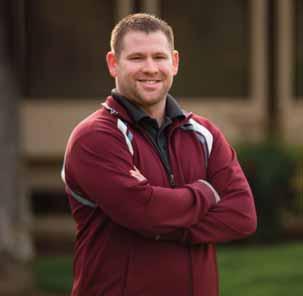
This month, hundreds of students will graduate from U.S. Mennonite Brethren schools—Tabor College in Kansas, Fresno Pacific University and Fresno Pacific Biblical Seminary in California. FPBS graduate Kyle Buller is an example of the kind of students and future leaders who are shaped by our schools.
Kyle Buller didn’t go to seminary to be a pastor. In fact, he once said, “I’m not going to do ministry; that’s not for me.” But God has a funny way of working. Buller graduates this month from Fresno Pacific Biblical Seminary (FPBS), the Mennonite Brethren denominational seminary located in Fresno, Calif., with a Master of Divinity and is looking forward to his first pastorate. The seminary and several USMB congregations played a role in shaping his call to ministry and preparing him to pastor.
Buller made a profession of faith in Christ at an early age and credits the influence of Christian parents and a strong youth program at Neighborhood Church, Visalia, Calif., with providing a strong faith foundation. But, like many teens, he became more interested in friends and fun than in Jesus during his high school years.
He planned to become a therapist. So he earned his undergraduate degree from Fresno Pacific University, the Mennonite Brethren school in Fresno, Calif., then enrolled in the seminary’s counseling program.
Seminary a fresh start
Once at FPBS, he was ready for a fresh start for his faith. “I figured this was the time, if ever, to reach out to God and to come back to my foundation.” So within a few weeks of starting graduate school at the seminary, he sought help from a USMB congregation in Fresno, Mountain View Community Church. But instead of simply sitting in the back row as an attendee, like some would do, he asked for a job.
“I was very eager for a fresh start,” he says. “I wanted to be all in.”
Mountain View regularly trains interns, so leaders there took Buller’s odd request in stride and gave him an opportunity. Buller credits the people there with both leading him back to faith and affirming his ministry gifts.
“I changed dramatically,” he says. “My whole life was being transformed back to God.”
By the end of the year, he had changed his major and set his sights on a lead pastor role. “It’s been my passion ever since. I gave my life back to Christ, and I haven’t wanted to drift anywhere else. I want to serve in ways where I can be helpful and effective and show people that Jesus is alive.”
Practical training
Once Buller changed his major and changed course, the seminary provided the training he wanted, both inside the classroom and beyond.
According to Buller, the seminary professors are top-notch, and he speaks highly of the work FPBS faculty has done. More importantly, “all the professors place Jesus at the center.”
He has especially appreciated the practical coursework at FPBS, like the class on preaching with professor and longtime pastor Lynn Jost. Or learning about the day-to-day life of a pastor from Brian Ross, assistant professor of
KYLE BULLER
pastoral ministries. New curriculum has helped him think through baptism ceremonies, board meetings and everything in between.
Seminary prepared him for ministry outside the classroom, too. While online education is quickly growing—including at FPBS, where they have launched their first online master’s in ministry leadership and culture—Buller says the on-campus experience was the right fit for him.
“There’s so much I would’ve missed out on if I hadn’t been living on this campus,” he says. “There’s a community aspect to everyday life.”
That emphasis on community shows up through chapels, common meals, group meetings as well as in less formal opportunities to build relationships.
FPBS faculty member Ross notes that, although Buller is by nature an introvert, he can usually be found building friendships and has especially leaned into the diversity of the FPBS student body. “He’s such a relational guy,” Ross says.
Testing his call to ministry
Internships with two USMB congregations helped Buller explore and test his call to ministry. Buller served as a youth intern at North Fresno (Calif.) Church for three semesters, working with youth pastor Matt Ford. Ford says he appreciated Buller’s willingness to dive into an area in which he wasn’t especially comfortable: junior high ministry. Buller oversaw weekly gatherings, mentored both youth and adult volunteers and partnered with Ford in planning special youth events.
Ford says, “He not only threw himself in to ministry, but he did it with an open hand and an open heart, with a willingness to do anything and a teachable spirit.”
Even after the internship ended, Buller continued to serve at North Fresno, learning from lead pastor James Bergen and leading a prayer ministry. “Kyle’s an integral part of our congregation,” Ford says.
Last summer, Buller further tested his ministry wings with an internship at Bethel MB Church, Yale, SD, arranged through the seminary. Bethel is an established congregation of around 140 attendees in a rural area. For a California-grown guy whose primary church experiences had been in larger congregations, “It was a pretty big culture shock,” Bethel pastor Coalt Robinson says.
But Buller quickly embraced the opportunity to gain experience. He preached three times, taught adult Sunday school, organized youth events, attended board meetings and closely shadowed Robinson for a real-life view of pastoral ministry. “He had a busy summer,” Robinson says.
Buller prioritized relationships, spending time getting to know people and listening to them. The friendships he built have lasted beyond the internship; he visited at Christmas and continues contact with the congregation.
“I couldn’t have asked for a better experience with a better group of people,” Buller says. “It was one of the greatest summers I’ve ever had.”
The internship had a lasting impact on the Bethel congregation, too. Buller “put a face” to leadership development for them, Robinson says. “It makes you have a little more skin in the game.”
Launching into ministry
Buller has accepted a call to be lead pastor at Grace MB Church, Kitchener, Ont., a congregation of about 70 with a strong desire to reach out.
Although he once said he’d never be a pastor, Buller now looks forward to walking alongside a body of believers as they process and explore new ways to share the love of Christ. “I’m excited to help a church get to the point where they can be an outlet for that,” he says. —Myra Holmes

Taking it to the streets
Prayer ministry touches community members, participants
On the third Saturday of each month, a team of prayer volunteers from Mountain View Community Church, Fresno, Calif., takes the church’s prayer ministry to the streets. And to the mall, the grocery store and fast food restaurants.
The volunteers, usually about 10-25 people, first gather for a time of listening prayer, asking God who he wants them to encounter and encourage that day. Then they disperse to find those people and pray for them.
This unusual approach is simply “allowing yourself to be put in a place to share God’s love and compassion with people,” says prayer team member Ernie Escobedo.
Mountain View lead pastor Fred Leonard says the ministry is born out of a deep belief that God is a Good Father who seeks the lost and the prodigals. Leonard points out that people often ask God for a sign that he’s near and that he loves them.
“We’re willing to listen, then take a big risk and leap of faith and go encounter those people,” Leonard says.
Escobedo adds that Mountain View believes prayer is important not only within the church walls, but also in the community. “We’re expecting that God’s arms are bigger than our building,” he says.
Volunteers listen first
Beginning with a time of listening is critical. Escobedo says such listening prayer is based in strong prayer training at Mountain View. “Listening prayer is a huge part of what we do,” Escobedo says. Through practice both on third Saturdays and during other prayer times, he says, participants learn to distinguish between a distracted mind and a nudge from God, no matter how strange it seems. And the hints do sometimes seem strange: a name, a place or even objects such as a penguin, vacuum cleaner or cow.
Armed with these God-given hints, the prayer volunteers disperse in pairs and trios to find the people God wants to touch. They go to public places like Target, Kmart, the grocery store or, if the hint is a chicken, perhaps to a Kentucky Fried Chicken

Volunteers from Mountain View Community Church, Fresno, Calif., gather to listen for God’s guidance before going out to pray. “Every time we go, it’s a step of faith for each person,” says MVCC pastor Fred Leonard. “It’s a risk. And it’s saying, ‘God, you are a Good Father. You’re looking for the prodigals; you’re looking for the lost. You want to show them you love them and that you’re good.’”
restaurant. “God has taken us just about everywhere,” Escobedo says.
When they find someone to whom they think God is directing them, they introduce themselves, saying they are looking for the people God wants to bless that day and tell them how they match the hints the group has been given. People are usually “blown away,” Escobedo says, when they hear that the group—and God—has been looking for them. “It breaks the wall down.”
And then they pray.
Trained for any situation
Mountain View has an extensive prayer training ministry, led by prayer ministry pastor Esther Leonard, and Escobedo says the volunteers are well-equipped to pray in any situation. Whatever the volunteers might encounter as they take prayer to the community, they have first encountered at Mountain View.
Fred Leonard says it’s a form of proclaiming God’s kingdom on earth—a value Anabaptists hold dear. He points out that Jesus sent his disciples not only to proclaim the gospel verbally but also to heal, cast out demons and raise the dead. So the prayer volunteers pray for and expect healing of all kinds—physical, emotional, intellectual, relational.
And God does heal. Escobedo says one man was healed from blindness. Another time, the team met a woman who tearfully shared about her difficult marriage, and the volunteers were able to pray for healing in her marriage. While the volunteers didn’t see immediate healing, the woman shared that she never talks about her difficulties but was encouraged by the encounter.
Most of the time, Escobedo says, the response is very positive. “They experience God’s love.”
Of course, negative reactions happen, too. Volunteers have encountered those from other faiths who politely decline the offer of prayer. Some people simply don’t understand. One woman recently was frightened by the strangers with their odd request. Escobedo assures them, “This is not normal; this is Jesus at work.”
The volunteers have been asked to leave public places, but they have also experienced God’s protection, like the day they encountered store staff around every corner, but were never confronted.
Escobedo says the volunteers learn to trust God with the responses and the results. “You put it on God,” he says. “When you do that, he’s going to be faithful.”
Sharing God’s love
The goal of the prayer ministry is simply to bless: “Our main goal is to share Jesus’s love and compassion,” Escobedo says. “Our goal is to allow Jesus to touch them and for us to be used as vessels to reach out to people, however God wants to do that. All we’re doing is being a vessel of Jesus’s love and compassion.”
They do offer a Mountain View business card with service times and contact information as a resource and sometimes people follow up or come to a service, but that’s not the primary goal. “We don’t want them connecting with us,” Escobedo says. “We want them connecting with Jesus Christ.”
After they’ve prayed in the community for a while, the volunteers reconvene to share their experiences. Often the sharing is lengthy as volunteers share story after story of God touching lives. “Everyone’s faith is built up,” Escobedo says, and the next time they go out, they go with a sense of greater expectation that God is indeed at work.
Escobedo readily admits that it’s not an easy undertaking. Fear, hesitation, uncertainty and skepticism are all common reactions. But growth happens outside of the comfort zone. He says that allowing himself to be stretched in this way has changed him in positive ways “It’s made me want to hunger more for Jesus. It’s made me want to do what he does and go wherever God wants me to go.”
Leonard says that kind of openness is key to this prayer ministry. “God is a Good Father. When his children cry out to him, he uses us as his hands and feet. He wants to use everyone that way. Most times, though, we aren’t asking, we aren’t looking and we aren’t available.”
He says that people all over are seeking God. “God is sending someone to go meet them. Why not me? Why not you?”
Those who are interested in learning more about this kind of prayer outreach can contact Esther Leonard through Mountain View.
–Myra Holmes











Don Morris Mission USA director
Are we ready to buy in?
USMB future will focus on three convictions
The review of USMB ministries and structures that began in the fall of 2014 is now coming to completion. It has been a long 20 months of evaluation, analyzing, discussing, writing, praying, listening, reviewing, revising and praying even more. I won’t go into all of that process, but I do want to highlight the three core convictions that have emerged as the future focus for us as a conference of churches.
Various important convictions were laid out and examined by the groups assigned at different times to provide input for our future vision. In the end, three commitments percolated to the top as the center of what USMB will be about in coming years.
Drum roll please! The three core convictions—our overall collective strategic focus—will be local, national and global church multiplication/church planting/evangelism, intentional disciple-making and leadership development. Over the next several years, we will center ourselves on these three things and do all we can to serve, resource and network local MB churches to reach their full ministry potential in each of these areas.
This vision has emerged from a cross-section of our leaders and interested individuals. It has come from countless hours of processing and prayer. It comes to us with a huge amount of confidence that this is indeed inspired by and given to us by God. It’s not our vision; it’s his vision. But we all need to understand that it will require buy-in and commitment from the USMB family as a whole for this to truly impact us as we move forward.
So, what do these commitments really mean? What does it mean to say we will embrace local, national

and global church multiplication/church planting/ evangelism? Well, we envision the formation of networks of churches of various demographics, working with their district church planting boards and committed to significant teamwork. The national and district conferences will encourage and assist, as needed, in the formation and development of these networks of churches doing church planting together. This is often simply called churches planting churches.
And, what about intentional disciple-making? Again, we’ll seek to help create networks of churches that will join together to encourage one another as to how to move people in their churches toward real spiritual development, sharing of their faith and missional engagement. Helping people become dynamic and true followers of Jesus has been a hallmark of Mennonite Brethren for decades. We want to assist our churches to enhance that even more.
Finally, what are we referring to as we concentrate on leadership development? It’s obvious that we need vocational and lay leaders. How can we increase our ability to train new leaders? How can each church identify potential leaders and provide a pathway for them for learning? We think collectively we can do better at answering these questions than we have been doing.
As more is revealed about the new Future Story over the coming months and at the USMB National Convention in July in Denver, I hope and pray that we will all embrace these three core commitments. And by doing so, that we will witness God moving in a powerful new and fresh way among us.
So if a denomination has 100 churches, it needs to plant three each year just to break even. Don’t miss that three percent is that break-even point— it needs to plant five each year to grow!
Targeting those “done with church”
Medical crisis results in new Colorado church
Anew Mennonite Brethren church has been born in Pueblo, Colo. City Church, led by church planter Scott Thomas, held its first Sunday services Jan. 24 in their recently purchased building in Pueblo’s historic downtown district.
Thomas, who is also the associate national director for the C2C Church Planting Network of the Canadian Conference of MB Churches, has significant church planting experience. He was the national director of the Acts 29 Church Planting Network for several years. Three years ago he joined C2C.
“We believe God has called us with a special purpose in a special place,” Thomas says. “Our desire is to be open to those who have never been in church, never really explored Christianity and are not sure about it at all. City Church is a safe place. It’s also for those who are maybe done with the church. They’ve tried it, and for years they’ve been frustrated. City Church is a fresh and brand new place.”
Thomas, along with his wife, Jeannie, previously lived in Pueblo. About a year ago, the couple traveled to Pueblo from Canada for a visit. While flying to Pueblo, Jeannie became very ill and required emergency hospitalization. Her health problems have persisted, and the Thomases have chosen to remain in Pueblo as she receives treatment from the Colorado doctors who understand her condition. Thomas has been commuting from Pueblo to Canada on a regular basis for his work with C2C.
When a group of the Thomas’s Pueblo friends learned that they would be in town for an extended period of time, they approached Thomas about starting a new church. These City Church core leaders were hoping to engage in a new church that targeted the downtown area. It would be a church geared for people who don’t yet know Jesus. After much prayer, Thomas agreed, but with the stipulation that the church be affiliated with a denomination, and his hope was that it would be a Mennonite Brethren church.
“Scott has embraced our Confession of Faith and in particular is drawn to our focus on discipleship and reaching the lost,” says Don Morris, Mission USA director. “Our desire to reach the lost, both locally and internationally, is something he appreciates.”
Morris and Tim Sullivan, Southern District Conference (SDC) minister, met with the City Church leaders, and it was a unanimous decision for City Church to be an MB church.
“Scott sees himself as a Mennonite Brethren and wanted this new church to join as well,” says Morris. Thomas appreciates the accountability that comes with being part of a family of churches, as well as the autonomy given to each church, says Morris.
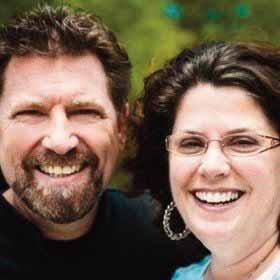
The SDC and Mission USA are providing church planting subsidy in this joint venture that currently involves about 40 people. MB Foundation, the stewardship ministry for U.S. Mennonite Brethren, helped to finance the purchase of the building that is now City Church’s home through the MB Loan Fund.
“We often talk about how fun it is to watch as God orchestrates things to get a new church started,” says Morris. “City Church is certainly one of those situations where it’s just so obvious that God brought all the pieces together for this new baby MB church in Pueblo to be born.”—Mission USA

Give up!
Rethinking
ALil Goertzen

attitudes, actions when caring for others
ll of us come into the world and immediately begin to “give up.” We give up the comfort and safety of the womb when we are born. Moving to the teenage years, we give up the days of childhood. We give up childish ways as we mature.
At some point many of us give up our larger homes and downsize to smaller accommodations. We give up positions of responsibility and leadership. We give up our driver’s license and look for alternate means of transportation. We give up our independence when others need to come in and tend to our personal needs.
Walking alongside those who are adapting to the rapid changes around them as they age, we caregivers also need to give up some things. Here is what I have learned as my family walks this road with my parents and other elderly loved ones.
Give up being in control of everything. As a caregiver, it is wise to encourage the elder person to maintain as much control of their surroundings as possible. When safety for them and others becomes a concern, then a different approach is needed. Assist them with decision-making and help guide the process.
Give up correcting their stories. Facts may not be clear, and story lines may be drawn from several different situations. As much as possible, help steer the story without correcting. Do not argue about the details or insist that the story is wrong. At that moment, the elder person is likely not able to distinguish accurately what they desire to convey. Be gentle. Next time, the same story may be told very accurately!
Give up being frustrated with their habits. Many elders grew up in a time when
everything was saved and reused. This mentality of “it will come in handy sometime” continues through their lives. Rather than throwing out their beloved stuff, find ways of recycling or reusing these items. Sometimes local community centers can put those tin cans, miscellaneous hand tools, margarine containers and string collections to very good use during their craft and activity time. It may help our elders to let go of some of these items when they see someone benefitting from their collection.
Give up trying to do the caregiving on your own. Depending on the required level of care, looking after an elder can be very time-consuming. Providing good care may require the assistance of trained personnel like home care workers, medical professionals and companions who then become the support team. Establish good communication with this support team and keep them informed of changes and concerns. When possible, have two or three family members or friends be the primary contact persons when the support team has concerns. Have these same family members attend medical appointments so that information is communicated consistently and in context.
In the midst of all these changes and challenges, God is there. He knows the pain and struggle of facing another “golden” day of increased age. As much as possible, encourage the elder to continue attending worship times. Engage them in Bible reading and prayer time, reminding them that God continues to be their Heavenly Father and loves them deeply. He has not given up.
Lil Goertzen is editor of The Recorder, the Evangelical Mennonite Mission Conference magazine.

Harold Jantz
Providing a gentle answer
Nickel’s book responds to attack on Bible
In The Gentle Answerto the Muslim Accusation of Biblical Falsification, Gordon Nickel has undertaken the challenge of answering Izhar al-Haqq, a polemic directed at the Bible. It came out of a debate between a Shia’ Muslim scholar and a Christian missionary in the 1860s and was first published in book form in 1864.
The missionary was thoroughly routed by Rahmat Allah Keiranwi’s use of 19th-century skeptical German scholarship. Out of the debate came a polemic against the Bible, originally in Arabic, then translated into Urdu and English and circulated widely to this day. Nickel had his work cut out for him.
If one accepts the viewpoint of Izhar al-Haqq, one would believe that the reliability of the Old and New Testaments have once and for all times been thoroughly discredited, because they were “altered almost beyond recognition.”
Nickel has a doctorate in Islamic studies and wrote his doctoral thesis on Narratives of Tampering in the Earliest Commentaries on the Quran and is likely as qualified as any scholar might be to address the claims made in Izhar al-Haqq. His great strength lies in his linguistic abilities that allow him to read early Muslim commentaries in the original languages.
In The Gentle Answer Nickel has set out to respond to the polemic, attempting to make the case for “the reliability of the Bible’s witness to Jesus in a manner that matches Jesus’ teaching and example.”
He opens with an invitation. “Dear reader,” he writes, “this book is an invitation to read and reason together...to invite friendly conversation between Muslims and non-Muslims. The accusations of the Izhar alHaqq must be answered. Not to answer might mean to some that the accusations...are correct or that non-Muslims don’t know how to answer, [or] have no answer.”
In 493 pages, Nickel takes an approach that essentially asks the same questions of the Quran that are asked of the Bible. What can one say about a reliable text based on manuscript evidence? What do the

texts say? What have commentators stated over the centuries, both Muslim and Christian or Jewish, about their Scriptures?
Nickel clearly settles the claim in Izhar al-Haqq that the Old Testament (OT) Scriptures had references to Muhammed that were tampered with so they disappeared. He shows that these manuscripts in some cases go back as far as eight centuries before Muhammed and read the same then as they did in Muhammed’s day. He also shows how commentators in the first centuries of Islam wrote approvingly about the integrity of the Old and New Testament texts, even if they disagreed with them. He examines closely what is known about manuscripts of both the biblical testaments and the Quran and shows that in both cases there are manuscript traditions with differences. Neither the Bible nor the Quran can claim only one manuscript tradition, even if many Muslims are taught otherwise. He explains reasons for differences in readings. He also explores both the Muslim and Christian approaches to the most authoritative texts.
The Gentle Answer is written in four sections. It takes some persistence to work through the material in the first three, but the rewards are well worth the effort. The fourth section is a most attractive presentation of the essential message of the Gospel communicated by the New Testament in a way that might appeal to Muslims.
The Gentle Answer is a book written to address a specific challenge—the polemic represented by Izhar al-Haqq. However, readers who come to it will not only have their knowledge of Islam greatly expanded, they will also gain a much greater appreciation for the gospel offered to us in Jesus Christ.
The Gentle Answer, published in 2015 by Bruton Gate, is available through Kindred Productions, the North American MB publishing ministry. Harold Jantz has served as editor of the MB Herald, the Canadian Conference of MB Churches magazine.
For those of us with creative gifts, publishers are now offering journal edition Bibles that provide a way to reflect our spiritual journey inside the Bible we read and study. These Bibles typically are in single-columns with lightly ruled lines in extra-wide margins on thicker paper and encourage us to illustrate our faith. Check out Zondervan Bibles with NIV, KJ and NKJ versions and www.illustratedfaith.com which offers an ESV translation.


milestones
BAPTISM/MEMBERSHIP
Chloe Flaming, Theresa Sanchez, Curtis Balakian and Paige Howard were baptized March 27 and received as members of Reedley (Calif.) MB Church
Jabarri Cumbry, Shayne Dubberke, Kara Guzman, Rebecca Lee, Lindsey McNeely, Justin Moore and Duncan Wanless were baptized March 27 at North Fresno (Calif.) Church
Andrew Bloemhof, Kelsie Bloemhof, Tayler Calvin, Brooke Cummings and Jose Felix were baptized March 27 and received as members of Shafter (Calif.) MB Church
Noah Griffin and Gunner Sorrel were baptized March 27 at Trailhead Church, Littleton, Colo
Kham Phomthaila, Noy Lanenavong, Terry and Debra Brensinger, Orie and Ina Roth and Arlene Flores Smith were received March 27 as members of Butler MB Church, Fresno, Calif
Ed Dellinger was baptized Feb. 14 and received as a member of Buhler (Kan.) MB Church
Bunny Dellinger, Larry Thiessen, Brian Unruh and Madalyn Unruh were also received as members.
Matt and Emily Defilice, Donna Wall, Justin and Jaime McAlister, Todd and Jennifer Boydstun, Dacia Droke, Josh and Nichole Thomson and Brian and Tracy Bishop were received as members Feb. 28 at Enid (Okla.) MB Church. Mark and Anne Brumbaugh were received as members Jan. 17.
Daniel and Cassie Reif and Jean Welle were received Feb. 28 as members of First MB Church, Wichita, Kan
Wayne and Lori Coffman and Alex and Gwen Morozov were received Feb. 21 as members of Community Bible Church, Olathe, Kan.
Abby Sechrist, Anthony Kaufman and Sarah Jost were baptized in January at Hillsboro (Kan.) MB Church. Jeff and JoAnne Jorgenson, Roger and Stephanie Sinclair, Gary and Connie Beavers and Brooke Vandever were received as members Dec. 6; Thomas Gill was received as a member Jan. 17.
Penellope Dills, Kalliope Dills, Jake DeVos, Christine Halley, Milo Nemetz and Calvin Nemetz were baptized Feb. 28 at Laurelglen Bible Church, Bakersfield, Calif.
WORKERS
Jeremy Jordan, pastor of Memorial Road MB Church, Edmond, Okla., will be on sabbatical May through July.
Jason Hofer resigned as youth pastor at Reedley (Calif.) MB Church, effective Feb. 26.
Kathy Manning is the interim children’s min-
istry director at Dinuba (Calif.) MB Church as of Feb. 1.
David Sletten is serving as interim pastor at Cornerstone Community Church, Topeka, Kan
Matt Ford has resigned as youth pastor at North Fresno (Calif.) Church. His last Sunday was April 3.
North Oak Community Church, Hays, Kan., held a dessert reception March 6 honoring retiring associate pastor John Wiker and his wife, Evie.
DEATHS
Bartel, Salome Kroeker, Reedley, Calif., member of Corn (Okla.) MB Church, March 24, 1922—Feb. 18, 2016. Parents: Peter K. and Maria (Schmidt) Kroeker. Spouse: Peter Bartel. Children: Rhoda Enns, Philip, Lydia Wall; nine grandchildren; 14 great-grandchildren.
Hein, Michael, Hillsboro, Kan., of Hillsboro MB Church, Sept. 4, 1950—Jan. 22, 2016. Parents: Emice and Lydia Hein.
Hofer, Debra J. “Debbie,” Huron, SD, of Bethesda Church, Huron, March 5, 1965—Feb. 8, 2016. Parents: DeVere and Delaine Williams. Spouse: Don Hofer. Children: Rebekah Kemink, Joshua, Jessica.
Kliewer, Gerald R., Grants Pass, Ore., Oct. 8, 1946—Jan. 16, 2016. Parents: Alvin John and Pearl June (Nickel) Kliewer. Children: Nickolas, Pamela, John; three grandchildren.
Kliewer, Martha Ann, Corn, Okla., member of Corn MB Church, April 13, 1930—Feb. 7, 2016. Parents: David and Martha M. (Friesen) Reimer. Spouse: Harvey Kliewer. Children: Lori Couch, Steve, Keith; six grandchildren; six greatgrandchildren.
Lepp, Alvin R., Santa Maria, Calif., member of Shafter (Calif.) MB Church, Sept. 27, 1932— Feb. 19, 2016. Parents: Frank and Matilda Lepp. Spouse: Iva Lepp. Children: Wayne, Karen Anderson; two grandchildren; three great-grandchildren.
Mulligan, Velma Louise, Shafter, Calif., member of Shafter MB Church, Aug. 29, 1922—Feb. 21, 2016. Spouse, John Mulligan, deceased. Children: Tim, Kathy Lindberg, Pat, Mike; 13 grandchildren; nine great-grandchildren.
Penner, Adalou, Cordell, Okla., of Bible MB Church, Cordell, Aug. 25, 1937—Jan. 12, 2016. Parents: Osborne Kiefer “OK” and Maudie (Matledge) Isbell. Spouse: Wayman Penner, deceased. Children: Vickie Esau, Cathy Dick, Sherry Widener, Sandy, Randy.
Peters, Robert J., Shafter, Calif., member of Shafter MB Church, July 22, 1929—Dec. 16, 2015. Parents: Jacob J. and Maria Peters. Spouse: Arlene Strauss, deceased. Children: Kendra Penner, Clark; three grandchildren.

Oklahomans gather for 50-plus event
Pine Acres Church, Weatherford, Okla., invited those 50 and older from USMB congregations in Oklahoma to an event Feb. 19-20 at Pine Acres. The event, called “2T22: Passing the Faith Along,” aimed to challenge seniors to continue in ministry and to encourage fellowship among those from area churches. Some 38 people attended from four area churches: Pine Acres, Corn MB Church, Fairview MB Church and Memorial Road MB Church, Edmond. Gaylord Goertzen, retired USMB pastor from Hillsboro, Kan., spoke on the theme from 2 Timothy 2:2, which talks about entrusting the faith to those who will then teach others. Tony Cannon, associate pastor at Pine Acres and leader of the church’s “8 Tracks” ministry for those 50 and older, says, “As seniors, 50plus, we are still challenged to keep passing the faith along. We never retire from that truth.” The gathering also included times of fellowship to encourage those from various churches get to know one another. Following on the heels of the event’s success, about 45 seniors from PAC, Fairview MB, Memorial Road and Corn MB joined together for a trip to Branson, Mo., April 21-23.


Oregon pastor dies
Lowell Stutzman, USMB pastor, businessman and mission volunteer from Grants Pass, Ore., died March 21 of an apparent heart attack. Stutzman and his wife, Patty, served for 20 years as the pastoral couple at New Hope Bible Church, Grants Pass. Stutzman was bivocational, also working at the family building supply business. “(His) passion for Jesus and the church was at the core of his being,” says Gary Wall, the Pacific District Conference minister. “Lowell had a gracious and patient pastoral ministry in a complex multicultural congregation.” Stutzman served on the MB Mission board for two terms, from 2006 to 2013, and was a short-term mission team leader for multiple trips on MB Mission’s SOAR, ACTION and ACTION Basketball programs. Stutzman was born Aug. 1, 1951, to Leon and Luella (Sharer) Stutzman. He married Patricia Schrock Aug. 14, 1970. He is survived by his wife; sons, Derek and Julie (Uhl) Stutzman and Kyle and Meena (Magar) Stutzman, Grants Pass; daughters, Maria and Wendell Miles, Edmonton, Alta., Monica and Jesse Abeler, Edmond, Okla., and Nicole Murray, Grants Pass; six grandchildren, his parents, two brothers, Douglas and Mark, and numerous extended family members.

Ratzlaff, Opal Esther, Shafter, Calif., member of Shafter MB Church, Oct. 29, 2012—March 21, 2016. Parents: William and Nina May Day; Spouse: William “Bill” Ratzlaff, deceased. Children: Joel; two grandchildren; four great-grandchildren.
Reimche, Marjorie Kathrine Toews, Harvey, ND, member of Harvey MB Church, Oct. 4, 1921—Feb. 17, 2016. Parents: JJ and Marie (Friesen) Toews. Spouse: Clifford Reimche, deceased. Children: Judy Baggett.
Schroeder, Esther Luana, Buhler, Kan., of Buhler MB Church, Aug. 19, 1922—Dec. 13, 2015. Parents: Isaac D. and Anna (Ediger) Klaassen. Spouse: Irvin J. Schroeder. Children: Connie Cook, Lynett Wheeler, Ruth Quiring; six grandchildren; six great-grandchildren.
Tschetter, Rueben, Huron, SD, of Bethesda Church, Huron, Jan. 24, 1926—Nov. 22, 2015. Parents: Jacob B. and Rebecca (Wollman) Tschetter. Spouse: Dolores Gross. Children: Douglas, Janelle Klapperich, Peggy, Laurie; two grandchildren; four great-grandchildren.
Wedel, Paul T., Yale, SD, member of Bethel Church, Yale, Sept. 23, 1957—Sept. 27, 2015. Parents: Palmer and Goldie (Hofer) Wedel.
Wiebe, Phyllis Lorain, Los Osos, Calif., member College Community Church MB, Clovis, Calif., March 1, 1924—March 9, 2016. Parents: John and Meta Roskam. Spouse: Elias Wiebe. Children: Carol Hiebert, Daniel; two grandsons; three great-grandsons.
reaching in DISCIPLESHIP
Bethany Church, Fresno, Calif., hosted three evening seminars on “Engaging Neighborhood Beliefs” April 10-24. The seminars equipped attendees to better engage with those from different generations, Islam and Mormonism.
First MB Church, Wichita, Kan., is offering a series of free workshops for those interested in creative arts and media. The first workshop, held Feb. 15, focused on the basics of photography. The church hosted a one-day parenting conference titled “Parenting with Love and Leadership” Feb. 21, featuring psychologist and author John Rosemond.
Bethesda Church, Huron, SD, offered a Sunday morning class designed to help leaders improve their skills and embrace a greater vision Feb. 7April 24.
Thirteen children prayed to receive Christ during Wednesday night children’s programs Feb. 17 at North Oak Community Church, Hays, Kan.
“Mission Possible” Sunday Feb. 21 at Laurelglen Bible Church, Bakersfield, Calif., featured
four informational sessions, with input from missionaries, dramas, food, prayer and opportunities to get involved.
FELLOWSHIP
Attendees of Ebenfeld MB Church, Hillsboro, Kan., went bowling April 10.
North Park Community Church,Eugene, Ore., hosted a “tax relief” potluck April 17 to celebrate the end of tax season. A Feb. 28 chili feed “presidential-themed” desserts such as cherry pie in honor of George Washington and bear claws in honor of Teddy Roosevelt. The evening also included a presidential trivia contest.
Men from Laurelglen Bible Church, Bakersfield, Calif., participated in a clay shooting event April 18.
A spring women’s event April 1 at Kingwood Bible Church, Salem, Ore., had a theme of “Colored by God.”
Deacons from Reedley (Calif.) MB Church hosted a dinner for all those 75 and older March 6. Women brought items to exchange Jan. 25 for a “soup and swap.”
An ongoing women’s ministry event at Koerner Heights Church, Newton, Kan., called “Room at My Table,” is hosted in different homes throughout the year. It is intended to build relationships beyond the church walls. A Feb. 27 gathering also included a service project for Mennonite Central Committee.
Attendees of Axiom Church, Peoria, Ariz., held a volleyball tournament March 6.
Men from Zoar MB Church, Inman, Kan., went fishing together April 29-May2.
Senior adults joined junior high students from Hillsboro (Kan.) MB Church for a game night Feb. 17.
A family movie night Feb. 19 at Christ Community Church, Sioux Falls, SD, featured the film “War Room.”
Families from Birch Bay Bible Community Church, Blaine, Wash., traveled to a nearby mountain Feb. 20 for a “snow day” of sledding, tubing and other snow activities.
Ethiopian Evangelical Church, Aurora, Colo., held a Valentine’s dinner Feb. 12.
Attendees of Salem MB Church, Bridgewater, SD, went bowling together Feb. 14.
WORSHIP
A group from College Community Church MB, Clovis, Calif., explored creative dance as a form of prayer on the evening of Feb. 24.
reaching out
LOCALLY
Easter celebrations at Neighborhood Church, Fresno, Calif., included outdoor services, a free tritip dinner, crafts for kids and an egg hunt.
Lighthouse Church, Golden, Colo., hosted a free BBQ and carnival for the community on Easter Sunday.
A “snow brigade” of volunteers from Community Bible Church, Olathe, Kan., helped with snow shoveling and other small projects for homeowners in the area this winter.
Local Church Job Openings
North Fresno (Calif.) Church hosted a communitywide City Summit March 18-19. The event is a local version of the Christian Community Development Association, of which NFC is a member.
Volunteers from First MB Church and Lighthouse Community Church, Wichita, Kan., served lunch to children in a low-income neighborhood during spring break, March 14-18.
Neighborhood Church, Visalia, Calif., created a “social media” kit to help attendees invite friends to Easter activities via Facebook and Twitter. The kit included graphics sized for various social media channels, wallpaper for smartphones and suggested Tweets.
CLEARINGHOUSE
Senior Pastor: Koerner Heights MB Church, Newton, Kan., is seeking a full-time lead pastor. Koerner Heights is located in a community of 30,000 in south central Kansas, 20 miles from Wichita. Primary responsibilities include preaching, interaction with all church ministries and pastoral care. The candidate needs to have a passion for Jesus, kingdom growth, community outreach and the ability to equip the congregation for discipleship. For more information and application, visit koernerheights.org. Direct any questions to Ron Braun, search committee chairperson, at rdbraun@cox.net.
Pastor of Care/Counseling: Reedley (Calif.) MB Church is currently seeking a fulltime pastor of care and counseling. The pastor of care and counseling is responsible to oversee our pastoral care ministries, providing and being a resource for pastoral counseling, as well as equipping our church body to share in caring ministries for one another. For more information, please contact Pastor Malcolm Light at malcolm@reedleymbc.org, or visit www.reedleymbc.org/jobs
Student Ministries Pastor: Reedley (Calif.) MB Church is currently seeking a fulltime student ministries pastor. The successful applicant will oversee the ministry towards the high school students (grades 9-12) with a desire to: disciple students, develop spiritual maturity, provide quality Christian experiences, serve as a resource to parents/families and a resource to the RMBC community of faith. For
Bethany Church, Fresno, Calif., hosted spring sports camp March 20-26 for youth in grades three through six interested in volleyball and dodge ball. Each evening included an opening rally, skill sessions, team huddles and Scripture verse, snacks and prizes. Participants played in a tournament on the closing evening.
GLOBALLY
Youth from Shafter (Calif.) MB Church served with MB Mission in Mexico March 17-26.
High school students from First MB Church, Wichita, Kan., served in Mexico March 11-20. Short-term teams will serve in Paris, Mexico and Thailand this summer.
more information please contact Jessica at jessica@reedleymbc.org, or visit www.reedleymbc.org/jobs
Lead Pastor: Good News Fellowship, Ferndale, Wash., is seeking a full-time lead pastor. The lead pastor is called to use his skills and gifting: to preach and teach the Word of God, to share the good news of Christ with lost people, to provide spiritual and administrative leadership to equip the church family and to offer pastoral care and counsel in the church and in the community. For more information on the position and where to send your cover letter & resume, please visit www.goodnewsfellowship.org.
Youth Pastor: Kingsburg (Calif.) MB Church is an established and growing church. We are seeking God’s direction and guidance to fill the role of a youth pastor and worship leader. Please send inquiries to our email at kmbcsearch@gmail.com.
Associate Pastor: North Fresno MB Church is seeking a full-time associate pastor of student and family ministries. The church is located in an urban area of the 500,000-plus city of Fresno, Calif., and is highly involved in the surrounding neighborhood. Main responsibilities include leadership and oversight to junior high, senior high and college ministries, as well as other opportunities depending on giftedness. The candidate should have a passion for Jesus, the church and the city as well as demonstrated ability to disciple and equip young people. For more information or to apply, contact Aaron Wiens, board chair, at docwiens@gmail.com.
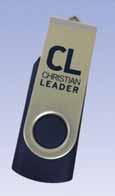



Business Administrator: Reedley (Calif.) MB Church is seeking a full time Business Administrator. The person called to this ministry would oversee the financial, facility, information systems, personnel management and general administrative functions of RMBC. Contact sheila@reedleymbc.org for a job description or to submit your resume.
Agency Job Openings
College Faculty: Fresno Pacific University is seeking qualified candidates for the following positions in the School of Humanities, Religion and Social Sciences: Faculty in Criminal Justice, Traditional Undergraduate Program and Faculty in Criminal Justice/Criminology, Degree Completion. The university is also seeking qualified candidates for the following position in the School of Natural Sciences: Clinical faculty in nursing. Complete job descriptions and an application are available online at: http://www.fresno.edu/visitors/careers
Planned Giving Advisor: MB Foundation is accepting applications for Planned Giving Advisor. This person will represent MB Foundation programs and services to individuals and ministries throughout the West Coast. The advisor will encourage charitable giving through current giving, estate planning and lifetime gift plans and provide customer service in all other areas of Foundation work. The individual will be based out of the Fresno Calif., office but will relate to individuals and churches throughout the Pacific District. If interested, send a letter and resume to: Jon C. Wiebe, President & CEO, MB Foundation, PO Box 220, Hillsboro KS 67063 (jwiebe@mbfoundation.com)
Travel
Visit Europe the Mennonite Way! Multiple hotel tours focusing on MennoniteAnabaptist history in Holland, Belgium, Germany, Switzerland, Poland and Ukraine. Organized by Mennonite Heritage Tours, www.mennoniteheritagetours.eu




















